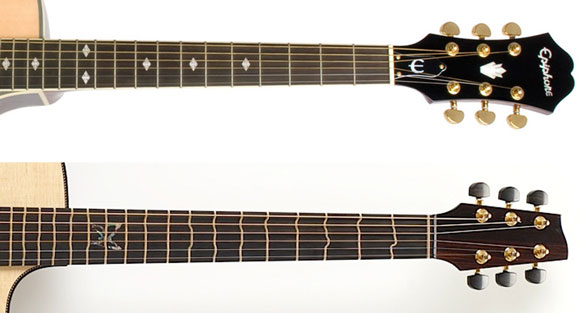Which Guitar Would You Play?
By George Sosich
Take a close look at the two guitars pictured below. If you were a guitarist, which would you pick up to play? Probably the one on the top with the straight frets (the thin metal pieces along the fret board that the strings are pressed down onto), right? Well, you might be surprised to hear that it’s the one at the bottom that some guitarists say makes the best sound. Odd, isn’t it?

Experienced guitar players know that it’s actually impossible to tune even the best-quality guitars to produce perfect pitch in every note and chord everywhere along the fret board. This is because of the nature of how guitars have been built for hundreds of years.
In typical guitars the traditional straight frets located intermittently along the fret board are not in the precise location required to produce perfect pitch everywhere along the fret board. This means that even if you tune a guitar precisely to sound perfectly in the chord E, it might sound out of tune while playing the chord G, or when playing the same E formation further up the fret board. This is true of other chords and notes as well. This is an annoyance that guitarists have to deal with and is one of the reasons that guitarists often retune their guitars between songs.
Some guitarists tune some strings slightly out of tune in such a way as to strike a happy medium so that no matter what note or chord is played anywhere on the fret board, it’s close enough to perfect pitch to sound good enough overall. Some guitarists adjust tuning for optimum pitch for certain chord patterns which sound out of tune for other songs with differing chord patterns.
One luthier (guitar maker) got so annoyed by constantly struggling with this inherent weakness in guitars that he decided to create a guitar that eliminated it altogether. The “true temperament guitar” with the crooked frets is what he came up with. He adjusted the frets by measuring precisely the position where each note has to be “fretted” in order to produce perfect pitch everywhere along the fret board no matter what note or chord is played. This resulted in the frets looking rather twisted or mangled. The result, however, is what users claim is a beautiful guitar that just “sings.”
Of what significance is this to us? At first glance it would seem that the luthier had lost his mind to produce a guitar with such obviously misshapen frets. And yet the guitar produces a strikingly more harmonious sound than the so-called proper-looking guitar. Isn’t this so with us? The Bible clearly tells us that what looks right and proper to the natural man might not be fit for God’s use; in fact, the opposite might be true. Consider the following verses:
But the LORD said to Samuel, “Do not consider his appearance or his height, for I have rejected him. The LORD does not look at the things man looks at. Man looks at the outward appearance, but the LORD looks at the heart.”—1 Samuel 16:7
“Not by might nor by power, but by my Spirit,” says the LORD Almighty.—Zechariah 4:6
Because the foolishness of God is wiser than men; and the weakness of God is stronger than men. For ye see your calling, brethren, how that not many wise men after the flesh, not many mighty, not many noble, are called: But God hath chosen the foolish things of the world to confound the wise; and God hath chosen the weak things of the world to confound the things which are mighty; And base things of the world, and things which are despised, hath God chosen, yea, and things which are not, to bring to nought things that are: That no flesh should glory in his presence.—1 Corinthians 1:25–29
But we have this treasure in earthen vessels, that the excellency of the power may be of God, and not of us.—2 Corinthians 4:7
With all our weaknesses and faults, we might feel imperfect and twisted like the frets of the true temperament guitar, but when in the hands of the master musician we can make beautiful melodies for Him. It’s when we believe ourselves to be so good and “straight” in our own righteousness, like normal guitars with their perfectly straight yet imperfect frets, that our sound can actually become slightly out of harmony and dissonant, resulting in a sound less attractive to the lost.
God allows us to be just as imperfect as we are for a purpose, so that we are more useful and He gets the glory.
Recent Posts
- The Story of Ruth—Part 1
- A Christian’s Happiness
- The Reality of Eternity
- Living the Walk of Faith
- Investing in Our Spiritual Life
- What Does Love Mean?
- God’s Nearness in the Pain of Losing a Child
- Sharing the Good News—One Heart at a Time
- The Call to Forgiveness
- 4 Reasons We Should Accept the Gospels as Eyewitness Accounts

